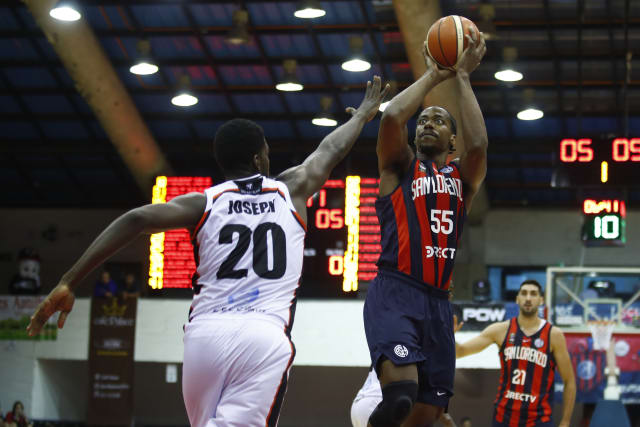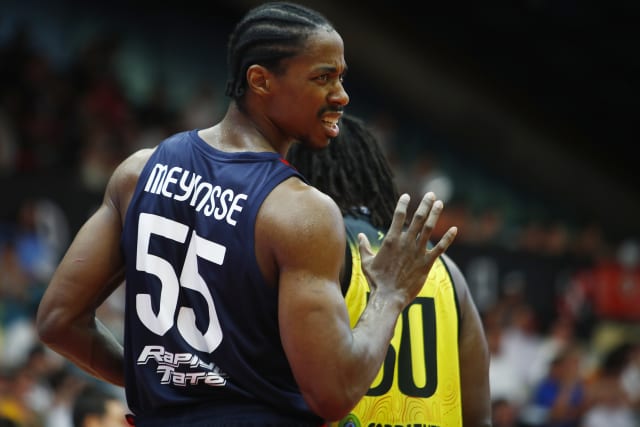Jerome Meyinsse has a South American heart
PONCE (DIRECTV Liga de las Américas) — American born player Jerome Meyinsse, whose father is from Ghana and his mother is Jamaican, begs forgiveness to the interviewer when he doesn’t find the right words
PONCE (DIRECTV Liga de las Américas) — American born player Jerome Meyinsse, whose father is from Ghana and his mother is Jamaican, begs forgiveness to the interviewer when he doesn’t find the right words to speak in Spanish. To compensate for this, he uses supplementary gestures: he opens his hands or clenches his fists and places them over his chest — right there, very close to his heart —where we usually locate our feelings. At 30 years of age, and after going through eight teams in three different countries (Argentina, Brazil and Venezuela) during nine seasons, he’s recognized by many of his human virtues —aside his playing abilities.
“I have a positive attitude towards life, and I reflect that on basketball. I'm a happy person and I have a contagious laughter, a lot of people like it. My parents taught me to be humble and treat everyone well. I’m not that type of cold-hearted American who thinks he's better. I was raised warmly and that’s how I am. That's why I like Latin America. People here are warm, they hug each other. I felt comfortable from the moment I got here, it's like I was born here,” explains the San Lorenzo center.
It's impossible not to do an overview of his beginnings in professional basketball, like when he agreed to pay for his ticket to Argentina to do a try-out for Club 9 de Julio of Río Tercero, not knowing if he’d pass and have a secure contract. “I was confident that they would sign me. That's why the first thing I did was to look in a map where Argentina was. I didn't know anything. I started to study their culture. It's important to know the place where you're going to live. That helps you in the transition,” assures Meyinsse, who also wanted to get to know his roots, so he traveled to Ghana and Jamaica.
Nine years have passed since the moment he set foot in Argentina’s rural country. From 9 de Julio (“against all odds we played a great campaign, we kept our category and built a great group") he moved on to Bahía Basket (“I learned a lot from Pepe Sánchez”) and then to Sionista de Paraná (“It wasn't a good experience. I didn't feel comfortable and I asked to leave two months later”). He quickly signed with Regatas Corrientes and the rest was history: “It was the best decision of my life. I adapted quickly, I understood my role and we built a great team. I always wanted to score and there I learned that you can do other valuable things, that you must do what the team needs you to do, and the most important thing is to help to win.” And like that the first two titles in Meyinsse’s career arrived: the 2012 Liga Sudamericana, and the 2013 National Argentine League.

But these achievements weren't enough and, in his search for new challenges and a better contract, he signed with Rio de Janeiro’s Flamengo. He immediately adapted to Brazil. His first objective was to learn Portuguese. “In the beginning I studied it on my own; then I had a professor that helped me a lot, but I understood that the best way to learn was going out to the street to talk to people. I learned a lot better like that,” he remembers, and proves this to be absolutely true, since his words in Portuguese frequently peek out in his conversation.
Why was learning the language a priority for him? The player born in Baton Rouge, Louisiana, is clear when he explains that “being able to talk to your teammates helps you to communicate better in the court and avoids conflicts outside it. It's too bad that many foreign players don’t learn the language of the country where they play.”
He was very happy in Brazil, because in 2014 he won everything available: The National League, the Liga de las Américas, and the FIBA Intercontinental Cup. But also, because he adapted in an unusual manner. “I really like açai (a native Brazilian fruit), and that created a bond between me and the fans. I also started to follow soccer. I learned the rules, I went to the field and I sat with fans. The only problem is that I'm horrible at playing soccer... These three years have been incredible. I've fallen in love with Rio de Janeiro's culture, its music and its beaches,” says Meyinsse, who also started dating his girlfriend then and live together since.
He's only had a bad moment in Brazil: when his father unexpectedly died from a heart attack. For Jerome, “it was a very hard blow, because I'm the only child and we were very close. Although I already knew it, it was then that I understood that we must enjoy each day like it were the last.”

Now, he's currently in San Lorenzo —once again in Argentina. “I was too comfortable in Flamengo. I wanted other challenges, I wanted to play under pressure again and in a team with a lot of fans. I wanted to feel anxious before the games and I found that in San Lorenzo,” he explains. He arrived and was champion in 2017. However, they didn't renovate his contract and he moved on to Atenas, in Córdoba. He assures that he didn’t take it personal: “That's part of the job. You must accept it. If you don’t, you’ll have a rough time. I left San Lorenzo in good spirits.”
Leaving San Lorenzo on good terms left the door open for his return, which happened a year later. “San Lorenzo are constantly presenting challenges. Everyone wants to defeat you, games are always hot, and they force you to give the best you can,” he states before his debut against Athens’ AEK in the FIBA Intercontinental Cup, which will take place in Rio de Janeiro and where he coincided with several old friends.
Meyinsse states that keeping these relationships that he created during all these years is essential to him. “I made many friends in Argentina and Brazil and learned a lot from their cultures. In the United States they teach us that we're the best in the world, but I feel like in South America they do things better. You must be humble to accept that things could be done different. For example, family is more valuable. That's important. In the United States we work our whole lives and don't enjoy our families. I tell that to my friends. I was going down that path. You enjoy life more in South America,” he says, and calculates some five years more in the courts, after which he expects to travel around the world.
Nonetheless, he now acknowledges that his place is in South America, between Buenos Aires and Rio de Janeiro: “I like living with Latinos, they're more affectionate. I don't want to return to my country's way of life. When I go on vacation to the United States, I visit my mom and my friends, and I immediately want to come back. I feel more comfortable here.”
Alejandro Pérez